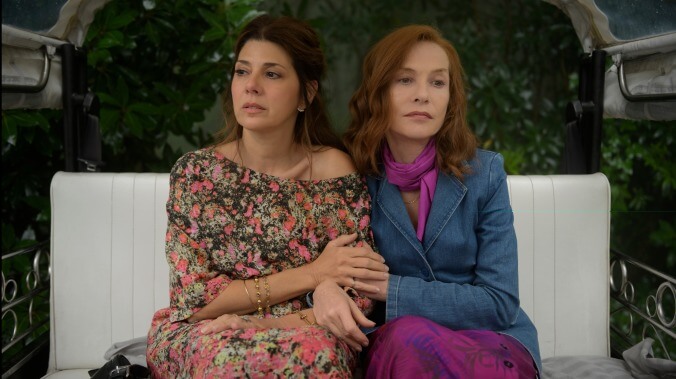Isabelle Huppert leads a packed ensemble in Ira Sachs’ mild Euro gabfest Frankie

Nobody goes to Hollywood in Frankie, but a few Hollywood types do show up in Sintra, the naturally beautiful, architecturally stunning Portuguese Riviera town where Ira Sachs’ latest movie unfolds. Actually, it doesn’t so much unfold as it slowly decompresses—which is odd, since the narrative theoretically builds toward a dramatic revelation involving the title character, a celebrated actor played by the arguably even more celebrated Isabelle Huppert. Frankie (real name Françoise) and her husband, Jimmy (Brendan Gleeson), have invited family and friends to join them on vacation in Sintra, without telling some of their guests why they’ve really been summoned. Long before that news emerges, however, everyone present starts grappling with their own varied ambitions and insecurities, in the tradition of picturesque ensemble films about the wealthy, beautiful, and vaguely troubled. Éric Rohmer used to make one of these pictures practically every year, but it’s a tricky genre to pull off, and Sachs (working with regular co-writer Mauricio Zacharias) doesn’t supply the neurotic wit that would make Frankie distinctive rather than just… nice.
Just laying out all the players in Frankie gets a little exhausting. Jimmy isn’t Frankie’s first husband. That would be Michel (Pascal Greggory, a regular presence in Rohmer’s films), who’s since come out of the closet and is on hand in the exposition-heavy company of a Portuguese tour guide (Carloto Cotta). So is Frankie and Michel’s son, Paul (Jérémie Renier), whom Frankie hopes to set up with her good friend Ilene (Marisa Tomei), a hairdresser to the stars. Unfortunately, Ilene has brought along her current boyfriend, Gary (Greg Kinnear), a cinematographer who decides that Sintra is the ideal romantic locale in which to suggest taking their fledgling relationship to the next level. Meanwhile, Sylvia (Vinette Robinson), Jimmy’s daughter from his previous marriage, contemplates leaving her husband, Ian (Ariyon Bakare), creating tension that doesn’t escape the notice of their teenage daughter, Maya (Sennia Nanua). At the center of all this emotional commotion is Frankie, who harbors a secret of her own—one that she isn’t terribly eager to reveal.
It’s probably best left unrevealed here, too, since the film doesn’t offer much else in the way of powerful moments. Huppert, who’s ostensibly its focus, is given relatively little to do; Frankie is first seen swimming topless and shrugging off concerns that she might be photographed by paparazzi, and she pretty much shrugs her way through everything that follows, supplementing that gesture with some sad smiles. The subplots involving her extended family remain resolutely low-key, and dialogue throughout sounds weirdly stilted—not surprising, perhaps, when it comes to the French and Belgian actors (who aren’t speaking their native language most of the time), but even Gleeson and Kinnear seem slightly off, somehow. Only Tomei gives a relaxed, counterintuitive performance, working against the script’s forthright blandness; her scenes opposite Huppert are the movie’s strongest, though it sometimes feels as if we’re watching these two actors enjoy getting to know each other, rather than witnessing a longtime friendship.
Ultimately, it’s not clear that Sachs ever quite worked out what kind of movie he wanted Frankie to be. With the notable exception of Married Life, a period literary adaptation, all of his films have fundamentally been character studies, often pivoting on social inequity—religious opposition to gay marriage in Love Is Strange, reluctant class warfare in Little Men. This time around, he and Zacharias have just assembled a dramatis personae and set everyone in motion, without seeming to have any particular destination in mind. Where you land may largely depend on your reaction to the movie’s ostentatiously composed final shot, which attempts a variation on the God’s-eye view that Abbas Kiarostami employs at the conclusion of And Life Goes On and Through The Olive Trees. In those films, the sudden shift to the epic plays like a culmination. Here, it looks more like desperation.